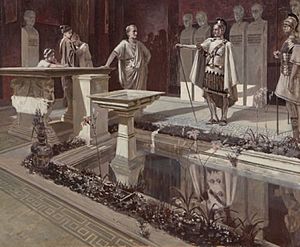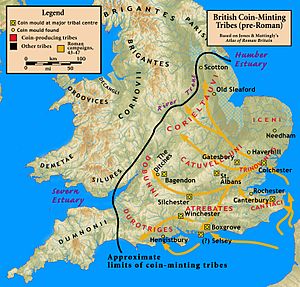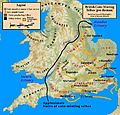Aulus Plautius facts for kids
Quick facts for kids
Aulus Plautius
|
|
|---|---|

At the Home of Aulus Plautius (from Iviis)
|
|
| Suffect Consul of the Roman Empire | |
| In office AD 29 – 29 Serving with Lucius Nonius Asprenas
|
|
| Preceded by |
|
| Succeeded by |
|
| Governor of Roman Britain | |
| In office AD 43 – 47 |
|
| Preceded by | New title |
| Succeeded by | Publius Ostorius Scapula |
| Personal details | |
| Occupation | Ancient Roman politician and general |
| Known for | Beginning the Roman conquest of Britain |
Aulus Plautius was an important Roman leader and general in the middle of the 1st century. He is famous for starting the Roman conquest of Britain in 43 CE. After the conquest, he became the first governor of the new Roman province of Britannia, serving from 43 to 47 CE.
Contents
A Roman Leader's Journey
Aulus Plautius had an interesting career. In 29 CE, he became a suffect consul. This was a high-ranking political job in Rome, like being a top government official. Later, he served as a governor in a Roman province, probably Pannonia. During this time, he helped build a road between Trieste and Rijeka. He also played a part in stopping a rebellion in 42 CE.
Invading Britain
The Roman Emperor Claudius chose Plautius to lead the invasion of Britannia in 43 CE. The main reason for the invasion was to help Verica, a king of the Atrebates tribe and a friend of Rome. Verica had been removed from his throne by a rival tribe, the Catuvellauni. Plautius was chosen because he was loyal to Claudius and had family connections to the Emperor's family.
The invasion force was very large. It included four powerful legions:
There were also about 20,000 extra soldiers from other groups, like Thracians and Batavians. A future emperor, Vespasian, was one of the commanders leading a legion.
A Surprising Mutiny
Before they could even cross the sea, Plautius faced a problem. His soldiers were afraid to go to Britain. They thought it was the end of the known world! But then, Narcissus, a trusted helper of Emperor Claudius, spoke to them. When the soldiers saw a former slave giving orders instead of their general, they joked, "Io Saturnalia!" This was a Roman festival where social roles were flipped for a day. The joke worked, and the soldiers agreed to go.
Battles and Conquest
The Roman invasion force likely landed at Richborough in Kent. The Britons, led by kings Togodumnus and Caratacus, tried to avoid big battles. Instead, they used guerrilla tactics, which means surprise attacks and quick retreats.
However, Plautius was a skilled general. He defeated Caratacus near the River Medway. Then, he defeated Togodumnus near the River Thames. Togodumnus died soon after, but Caratacus escaped and continued to fight the Romans.
After reaching the Thames, Plautius waited for Emperor Claudius to arrive. Claudius came with elephants and powerful weapons. He then led the final march to the Catuvellaunian capital, Camulodunum (Colchester). Claudius later proudly said that 11 British kings surrendered to him at Camulodunum.
Governing the New Province
After the conquest, the Romans created a new province called Britannia. Aulus Plautius was made its first governor.
The four Roman legions then worked to expand the new province:
- Legio IX moved north to build a camp where Lincoln is today.
- Legio XIV went into the Midlands, setting up a base near what is now Leicester.
- Legio II, led by Vespasian, marched through the south. They conquered many hill forts and even the Isle of Wight. Their base was likely near Exeter.
- Legio XX stayed near Camulodunum with other troops as a backup force.
Later, the main city of the province moved to Londonium, which is now London.
In 47 CE, Plautius was replaced by Publius Ostorius Scapula. When he returned to Rome, he was given a special honor called an ovation. The Emperor himself walked beside Plautius to and from the Capitol building, showing how much he respected him.
Family Life
Aulus Plautius came from an important Roman family. His father, also named Aulus Plautius, was a consul in 1 BCE. His younger brother was Quintus Plautius, who became a consul in 36 CE.
Aulus Plautius married Pomponia Graecina. She was known for mourning for forty years after a relative was executed. In 57 CE, she was accused of following a "foreign superstition," which some people think meant she had adopted a new religion. According to Roman law, her husband, Aulus Plautius, tried her case in front of her family, and she was found innocent.
Aulus Plautius also helped his nephew, Plautius Lateranus. In 48 CE, his nephew faced serious trouble, but Aulus Plautius's good reputation helped save him from execution. Lateranus was instead sent away from Rome.
Portrayals in Fiction
Aulus Plautius has appeared in several stories and films:
- He is a character in Henryk Sienkiewicz's novel Quo Vadis.
- He also appears in Simon Scarrow's novel The Eagle's Conquest.
- In the 1951 film Quo Vadis, Plautius (played by Felix Aylmer) and his wife Pomponia are shown as Christians, though this is not historically accurate.
- David Morrissey plays Plautius in the TV series Britannia (2018). This show tells a fantasy version of the Roman conquest, with Plautius as a main character.
Images for kids
 | Selma Burke |
 | Pauline Powell Burns |
 | Frederick J. Brown |
 | Robert Blackburn |




